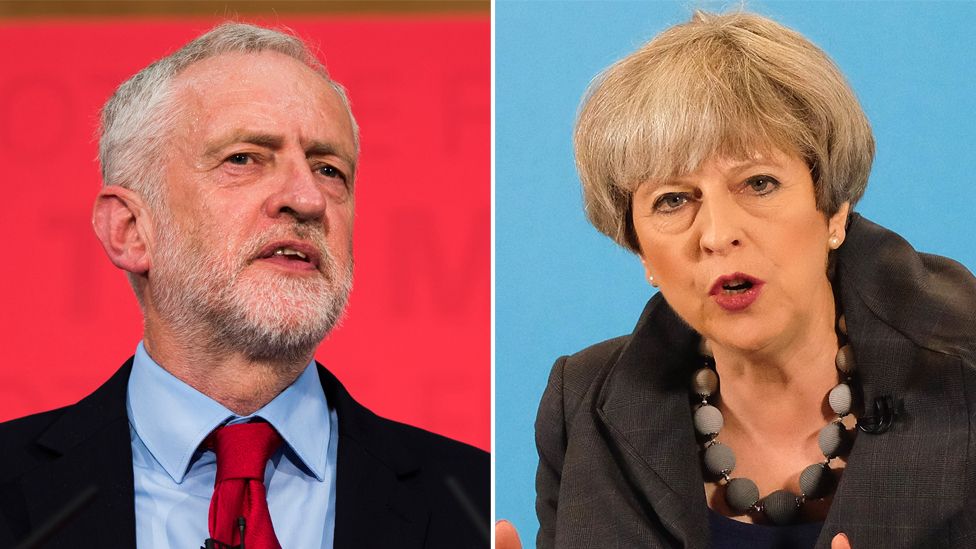Jeremy Corbyn and Theresa May clash over post-Brexit Britain
- Published
- comments

Theresa May and Jeremy Corbyn have set out competing visions of what they want for Britain after it has left the EU, with a week to go until polling day.
Mrs May said she wanted a "stronger, fairer and even more prosperous" country - and Mr Corbyn was "simply not up to the job" of delivering it.
The Labour leader claimed she would create a "low-wage, offshore tax haven" and a "toxic" mood in Brexit talks.
The Lib Dems said the PM's "hard Brexit" plan would harm the economy.
SNP leader Nicola Sturgeon said her party could have a role in preventing what she called an "extreme form of Brexit" if Mrs May won power, by pressing for continued access to the EU single market.
Conservative leader Mrs May used a high-profile speech to set out her vision of European Union withdrawal as part of a "great national mission" to build a "stronger, fairer and more prosperous Britain".
The prime minister said this future could only be delivered if voters backed the Conservatives when they went to the polls on 8 June.
Speaking in Teesside, she said: "If they do, I am confident that we can fulfil the promise of Brexit together and build a Britain that is stronger, fairer and even more prosperous than it is today."
She said Brexit offered huge opportunities to build a "Britain beyond Brexit that is more global and outward-looking. A Britain alive with possibilities."
She said it was time to "respect the decision of the British people" to leave the EU - something she said she was ready to do "from day one," unlike, she said, her Labour counterpart.
Theresa May: I am ambitious for Brexit
Jeremy Corbyn: EU citizens in UK 'will be guaranteed rights'
"He doesn't believe in Britain. He doesn't have a plan. He doesn't have what it takes.
"It's clearer than ever that just 11 days after the election when the negotiations begin, Jeremy Corbyn's focus wouldn't be on trying to negotiate a deal for Britain in Europe, but on trying to stitch up a deal with [SNP leader] Nicola Sturgeon and the rest."
BBC assistant political editor Norman Smith said there was a more optimistic, confident tone about what life would be like post-Brexit in Britain as the prime minister sought to give people a sense of better times ahead, following a campaign dominated by talk of "hard choices" and "huge challenges".
In his own speech on the same subject later, Mr Corbyn accused the Conservatives of putting jobs at risk and backing a plan that threatened to turn the UK into an "low-wage, offshore tax haven".
He told supporters: "So far the rhetoric and threats from the Tory government has fostered a toxic climate. Labour will start negotiations by setting a new tone.
"We will confirm to the other member states that Britain is leaving the European Union. That issue is not in doubt, but instead of posturing and pumped-up animosity, a Labour government under my leadership will set out a plan for Brexit based on the mutual interests of both Britain and the European Union."
That would start with a "clear commitment" to EU citizens already in the UK that their rights would be guaranteed, he said, saying that was the "best way to secure reciprocal rights" for British expats in other EU countries.
Tim Farron and the BBC's Andrew Neil have a heated exchange over Brexit
Nicola Sturgeon says a hard Brexit would be "devastating"
And he criticised Mrs May's mantra that "no deal is better than a bad deal" in Brexit negotiations, saying the UK needed "tariff-free access" to European markets: "Let's be clear, no deal is in fact, a bad deal, it's the worst of all deals."
The Labour leader praised his shadow Brexit team and said: "Labour is ready, ready to deliver a deal that gives British business and British society the chance to thrive in a post-Brexit world."
'Epic U-turn'
Mr Corbyn and Mrs May were on the same side in last year's EU referendum - against Britain leaving the EU - although they never campaigned together.
Both have said they respect the verdict of the British people, and have ruled out a second referendum on the divorce deal Britain negotiates with the EU.
The Lib Dems are also focusing on Brexit, warning of "serious staff shortages" in the NHS caused by EU nationals leaving the UK.
Citing "survey data", the party said as many as 26,500 members of staff could leave the country as a result of Brexit, and that replacing them could cost £265m over five years.
The party's Europe spokesman, Nick Clegg, said: "These are skilled and hard-working people, who all work tirelessly to look after all of us. Our NHS, and the care we all rely on, will suffer without them."
He also accused Mrs May of making "a u-turn of epic proportions" with her "upbeat" Brexit assessment - having previously campaigned to remain in the EU.
He added: "What comes next is not the sunny picture described in this delusional speech. Negotiating Brexit will be task of monumental proportions which - even if handled expertly - will do great damage to our prosperity, the state of our public services and Britain's place in the world."